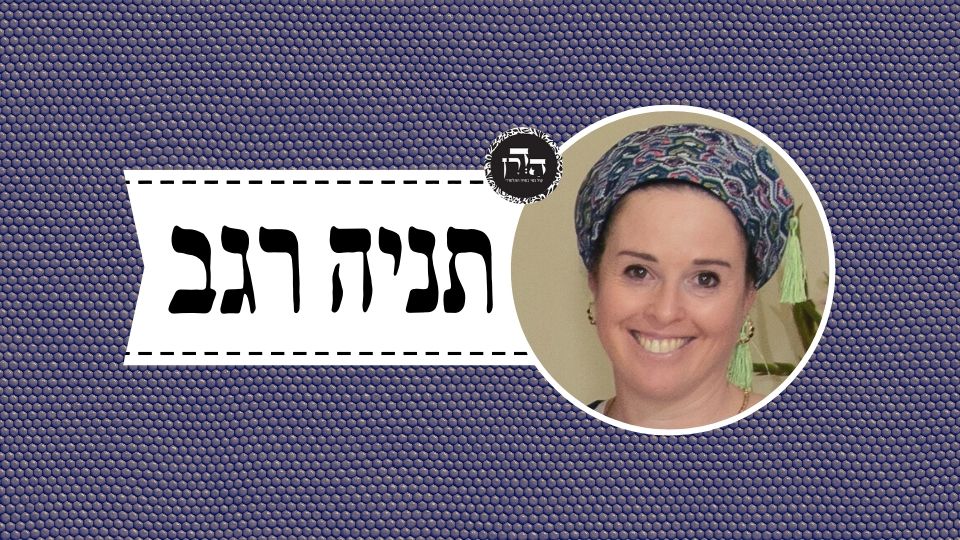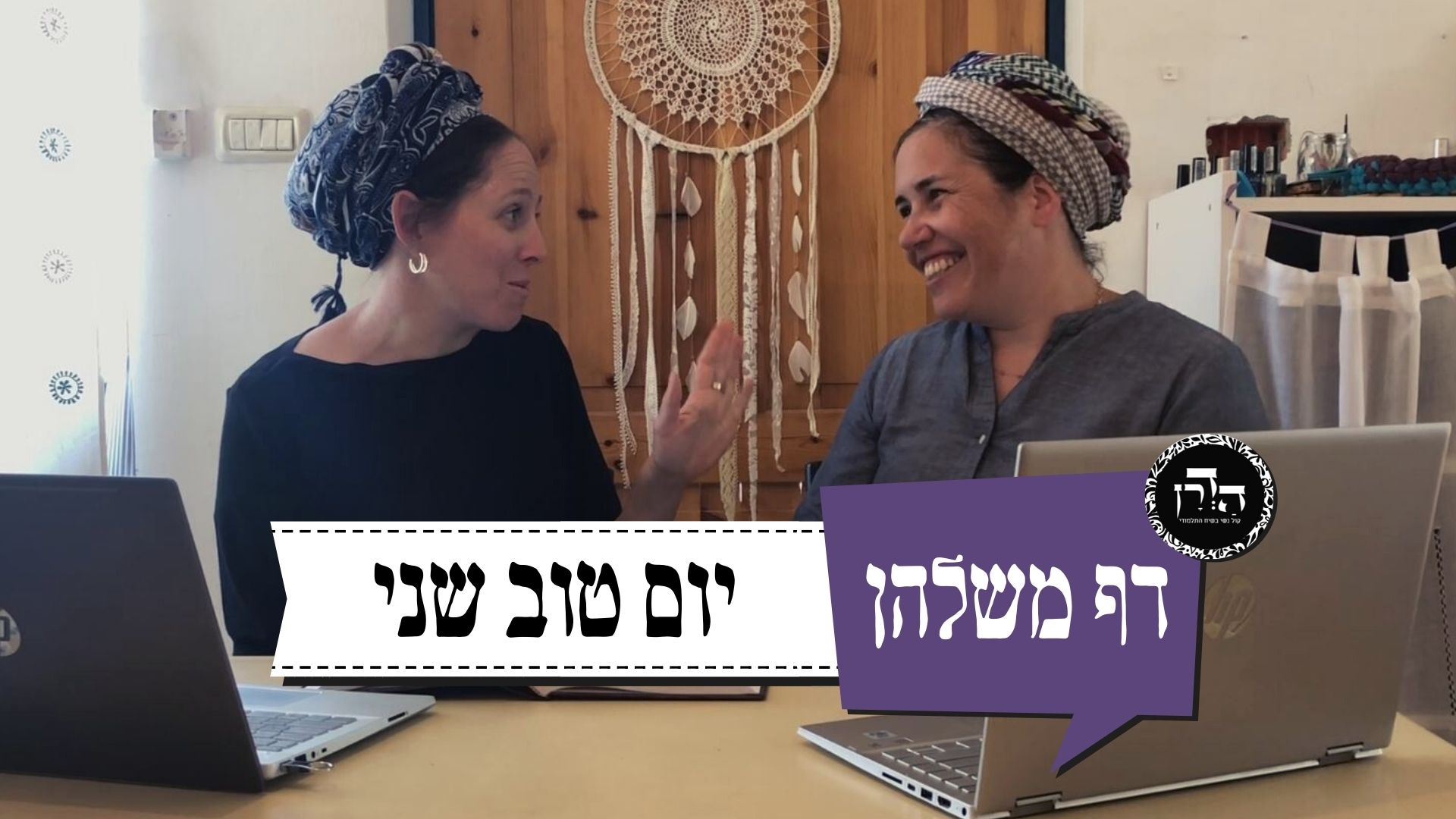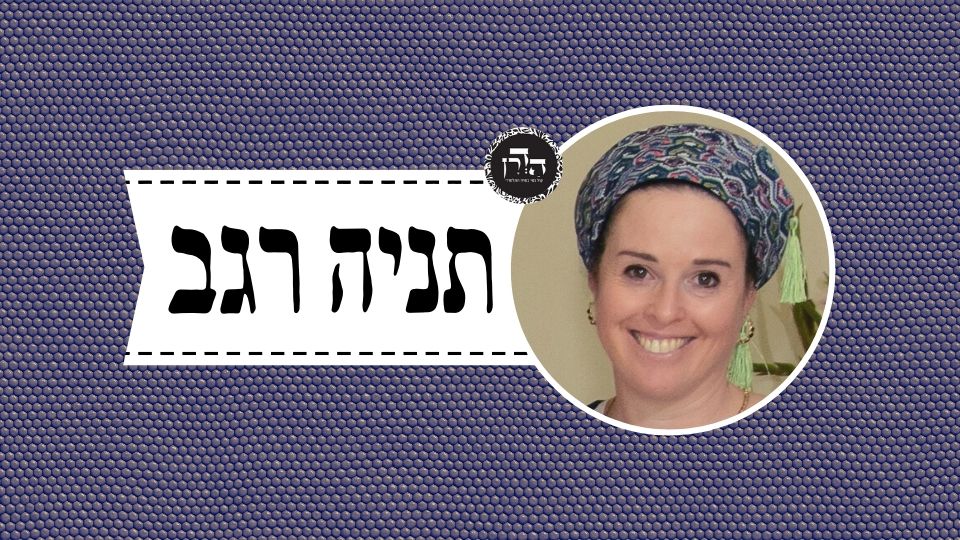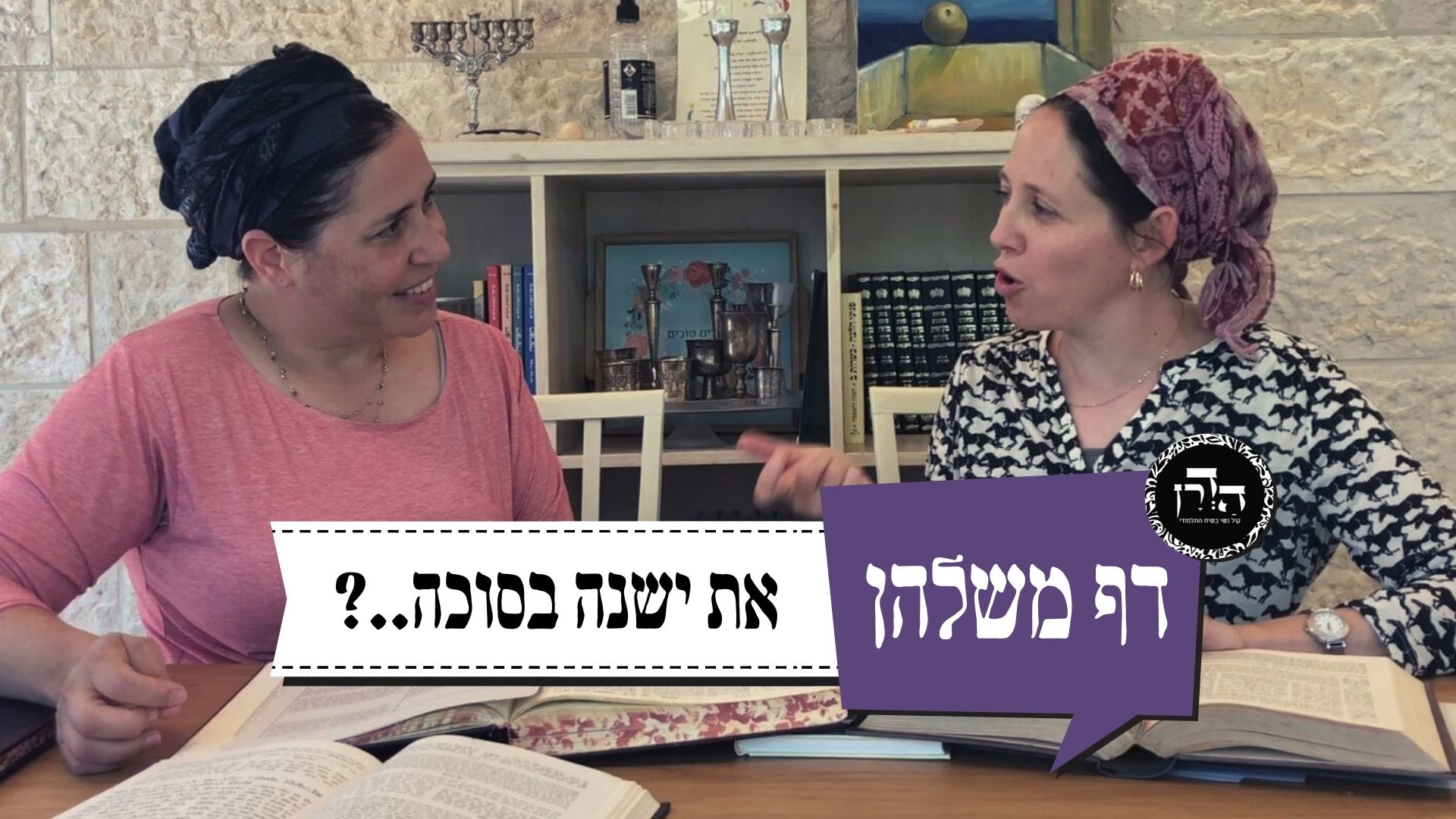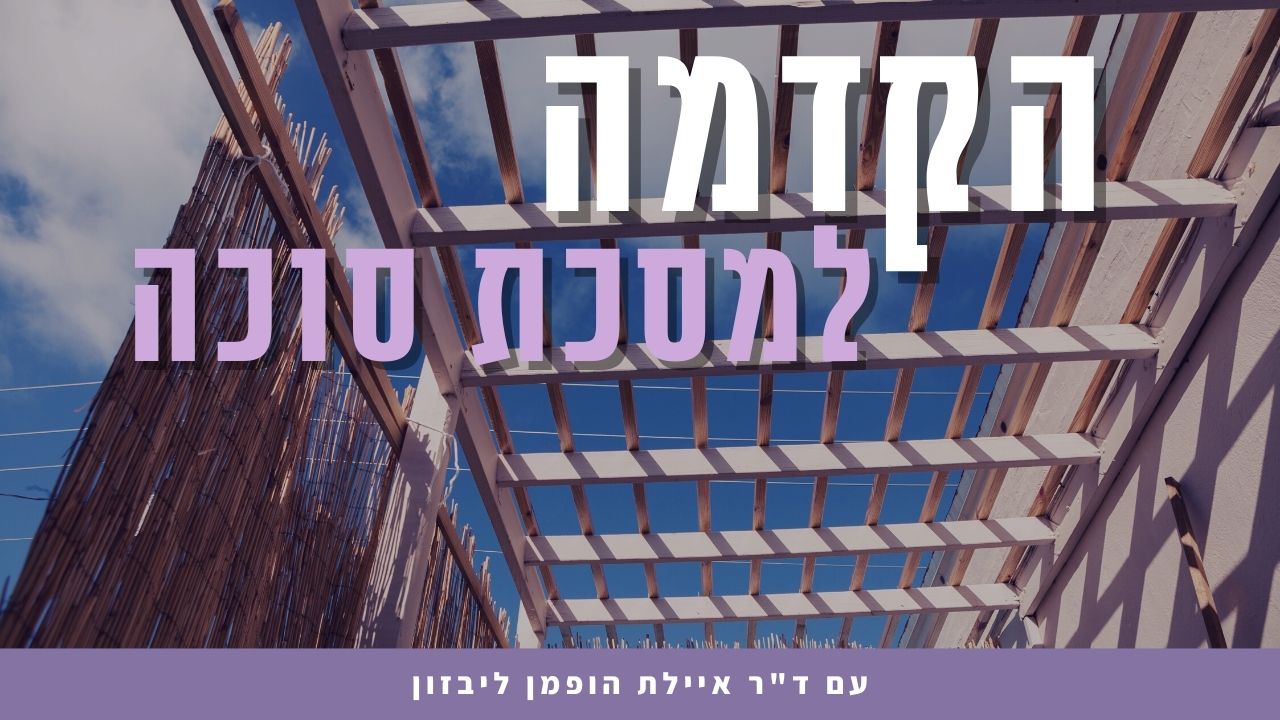יש כמה מחלוקות שונות בין ר’ אליעזר לחכמים. האם חייבים לאכול 14 סעודות בסוכה? האם אפשר להשלים סעודת ליל יום טוב הראשון בשמיני עצרת (או אולי בשאר ימי סוכות)? אם אפשר להשלים, איך? האם אפשר לעבור מסוכה לסוכה משך החג או צריך לאכול באותה סוכה? האם אפשר לבנות סוכה בחול המועד? האם אפשר לצאת ידי חובה בסוכה של מישהו אחר? האם אפשר ברגל לצאת מהבית או האם צריך להישאר בביתו לשמח את אשתו? הגמרא דנה בטעמים שעומדים מאחורי הדעות ובכל מיני שאלות נגד הדעות של ר’ אליעזר.

כלים
הלימוד החודש מוקדש לרפואת פיליס הכט, גיטל פעשא בת מאשה רחל על ידי חברותיה הרבות שאוהבות ומעריכות אותה.
כלים
העמקה
רוצה להבין מה באמת קורה מתחת לפני השטח של הסוגיה?
שיעורים, פודקאסטים והרחבות של מיטב המורות שלנו יפתחו לך עוד זוויות וכיווני חשיבה.
חדשה בלימוד הגמרא?
זה הדף הראשון שלך? איזו התרגשות עצומה! יש לנו בדיוק את התכנים והכלים שיעזרו לך לעשות את הצעדים הראשונים ללמידה בקצב וברמה שלך, כך תוכלי להרגיש בנוח גם בתוך הסוגיות המורכבות ומאתגרות.
פסיפס הלומדות שלנו
גלי את קהילת הלומדות שלנו, מגוון נשים, רקעים וסיפורים. כולן חלק מתנועה ומסע מרגש ועוצמתי.
סוכה כז
וְאָמְרוּ: הַעֲלוּם לַסּוּכָּה.
and they each said: Take them up to the sukka.
וּכְשֶׁנָּתְנוּ לוֹ לְרַבִּי צָדוֹק אוֹכֶל פָּחוֹת מִכְּבֵיצָה, נְטָלוֹ בְּמַפָּה וַאֲכָלוֹ חוּץ לַסּוּכָּה וְלֹא בֵּירַךְ אַחֲרָיו. הָא כְּבֵיצָה, בָּעֵי סוּכָּה. לֵימָא תֶּיהְוֵי תְּיוּבְתֵּיהּ דְּרַב יוֹסֵף וְאַבָּיֵי! דִּילְמָא פָּחוֹת מִכְּבֵיצָה נְטִילָה וּבְרָכָה לָא בָּעֵי, הָא כְּבֵיצָה בָּעֵי נְטִילָה וּבְרָכָה.
And when they gave Rabbi Tzadok less than an egg-bulk of food, he took the food in a cloth and he ate it outside the sukka and did not recite a blessing after eating it. The Gemara infers: Had they given him an egg-bulk of food, he would have been required to eat it in a sukka. Let us say that this is a conclusive refutation of the opinion of Rav Yosef and Abaye, who said that one is permitted to eat that measure in the context of a casual meal outside the sukka. The Gemara answers: No proof can be cited from here, because perhaps the reason the mishna emphasizes that Rabbi Tzadok ate less than an egg-bulk of food is that eating less than an egg-bulk does not require washing hands and reciting a blessing after eating it; however, eating an egg-bulk requires washing and reciting a blessing.
מַתְנִי׳ רַבִּי אֱלִיעֶזֶר אוֹמֵר: אַרְבַּע עֶשְׂרֵה סְעוּדוֹת חַיָּיב אָדָם לֶאֱכוֹל בַּסּוּכָּה, אַחַת בְּיוֹם וְאַחַת בַּלַּיְלָה. וַחֲכָמִים אוֹמְרִים: אֵין לַדָּבָר קִצְבָה, חוּץ מִלֵּילֵי יוֹם טוֹב רִאשׁוֹן שֶׁל חַג בִּלְבַד.
MISHNA: Rabbi Eliezer says: A person is obligated to eat fourteen meals in the sukka over the course of the seven days of the festival of Sukkot, one during the day each day and one at night each night. And the Rabbis say: There is no quota for the number of meals, and one may choose whether or not to eat any of the meals except for the meal on the evening of the first Festival day of Sukkot, which one is required to eat in the sukka.
וְעוֹד אָמַר רַבִּי אֱלִיעֶזֶר: מִי שֶׁלֹּא אָכַל [לֵילֵי] יוֹם טוֹב הָרִאשׁוֹן — יַשְׁלִים לֵילֵי יוֹם טוֹב הָאַחֲרוֹן שֶׁל חַג. וַחֲכָמִים אוֹמְרִים: אֵין לַדָּבָר תַּשְׁלוּמִין, וְעַל זֶה נֶאֱמַר: ״מְעֻוָּת לֹא יוּכַל לִתְקוֹן וְחֶסְרוֹן לֹא יוּכַל לְהִמָּנוֹת״.
And furthermore, Rabbi Eliezer said: One who did not eat a meal on the evening of the first day of the Festival should compensate with a meal on the evening of the last day of the Festival, on the Eighth Day of Assembly, despite the fact that he will not eat it in the sukka. And the Rabbis say: There is no compensation for this matter, and with regard to similar cases where it is impossible to rectify failure to fulfill a positive mitzva, it is stated: “That which is crooked cannot be made straight; and that which is wanting cannot be numbered” (Ecclesiastes 1:15).
גְּמָ׳ מַאי טַעְמֵיהּ דְּרַבִּי אֱלִיעֶזֶר? ״תֵּשְׁבוּ״ כְּעֵין תָּדוּרוּ. מָה דִּירָה — אַחַת בַּיּוֹם וְאַחַת בַּלַּיְלָה, אַף סוּכָּה — אַחַת בְּיוֹם וְאַחַת בַּלַּיְלָה.
GEMARA: The Gemara asks: What is the rationale for the opinion of Rabbi Eliezer, who mandates eating fourteen meals in the sukka? The Gemara answers that he derives his opinion from the verse: “In sukkot shall you reside” (Leviticus 23:42), which the Sages interpreted to mean: Reside as you dwell in your permanent home. Therefore, just as in one’s dwelling one typically eats one meal during the day and one meal at night, so too, in a sukka one eats one meal during the day and one meal at night.
וְרַבָּנַן? כְּדִירָה. מָה דִּירָה — אִי בָּעֵי אָכֵיל אִי בָּעֵי לָא אָכֵיל, אַף סוּכָּה נָמֵי — אִי בָּעֵי אָכֵיל אִי בָּעֵי לָא אָכֵיל.
The Gemara asks: And how do the Rabbis interpret that verse? The Gemara answers: They explain that a sukka is like a permanent dwelling. Just as in one’s dwelling, if one desires to eat, he eats, and if one does not desire to do so, he does not eat, so too, in the sukka, if one desires to eat, he eats, and if one does not desire to do so, he does not eat.
אִי הָכִי אֲפִילּוּ לֵילֵי יוֹם טוֹב רִאשׁוֹן נָמֵי!
The Gemara asks: If so, then according to the Rabbis, even on the first Festival evening as well one should not be required to eat in the sukka.
אָמַר רַבִּי יוֹחָנָן מִשּׁוּם רַבִּי שִׁמְעוֹן בֶּן יְהוֹצָדָק: נֶאֱמַר כָּאן ״חֲמִשָּׁה עָשָׂר״, וְנֶאֱמַר ״חֲמִשָּׁה עָשָׂר״ בְּחַג הַמַּצּוֹת. מָה לְהַלָּן — לַיְלָה הָרִאשׁוֹן חוֹבָה, מִכָּאן וְאֵילָךְ רְשׁוּת, אַף כָּאן — לַיְלָה הָרִאשׁוֹן חוֹבָה, מִכָּאן וְאֵילָךְ רְשׁוּת.
Rabbi Yoḥanan said in the name of Rabbi Shimon ben Yehotzadak: There is a verbal analogy between the festivals of Passover and Sukkot. It is stated here, with regard to Sukkot: “On the fifteenth day of this seventh month is the festival of Sukkot for seven days unto the Lord” (Leviticus 23:34). And it is stated: “And on the fifteenth day of the same month is the festival of matzot unto the Lord” (Leviticus 23:6) with regard to the festival of Passover. Just as there, with regard to Passover, on the first night there is an obligation to eat matza and from that point onward it is optional, as from that point onward the only obligation is to refrain from eating leaven, so too here, with regard to Sukkot, on the first night there is an obligation to eat in the sukka and from that point onward it is optional.
וְהָתָם מְנָלַן? אָמַר קְרָא: ״בָּעֶרֶב תֹּאכְלוּ מַצּוֹת״, הַכָּתוּב קְבָעוֹ חוֹבָה.
The Gemara asks: And there, with regard to Passover, from where do we derive that there is an obligation to eat matza on the first night? The Gemara answers that the verse says: “In the evening you shall eat matzot” (Exodus 12:18). The verse established it as an obligation.
וְעוֹד אָמַר רַבִּי אֱלִיעֶזֶר: וְהָא אָמַר רַבִּי אֱלִיעֶזֶר אַרְבַּע עֶשְׂרֵה סְעוּדוֹת חַיָּיב אָדָם לֶאֱכוֹל בַּסּוּכָּה, אַחַת בַּיּוֹם וְאַחַת בַּלַּיְלָה! אָמַר בֵּירָא אָמַר רַבִּי אַמֵּי: חָזַר בּוֹ רַבִּי אֱלִיעֶזֶר.
§ The mishna continues: And furthermore, Rabbi Eliezer said that one who did not eat a meal on the evening of the first day of the Festival should compensate with a meal on the evening of the last day of the Festival. The Gemara asks: But didn’t Rabbi Eliezer say that a person is obligated to eat fourteen meals in the sukka, one during the day and one at night? However, the compensatory meal on the evening of the Eighth Day of Assembly is not eaten in the sukka. Beira said that Rabbi Ami said: Rabbi Eliezer retracted his previous statement and agrees with the Rabbis that there is no quota for the meals that one must eat in the sukka, and it is only the meal on the first evening of the Festival that one must eat in the sukka. Their dispute is with regard to compensation if one failed to eat the meal on the first evening.
מַשְׁלִים בְּמַאי? אִילֵימָא בְּרִיפְתָּא, סְעוּדָה דְיוֹמֵיהּ קָא אָכֵיל. אֶלָּא, מַאי יַשְׁלִים — יַשְׁלִים בְּמִינֵי תַרְגִּימָא. תַּנְיָא נָמֵי הָכִי: אִם הִשְׁלִים בְּמִינֵי תַרְגִּימָא — יָצָא.
The Gemara asks: With what will he compensate for his failure to eat the Festival meal? If we say that he compensates with bread, he is thereby eating the festive meal of that Eighth Day of Assembly; how is it obvious that it is compensation for a different meal? Rather, what is the meaning of: He should compensate? It means that he should compensate by adding types of delicacies [targima]. That is taught in a baraita as well: If he compensated by adding types of delicacies, he fulfilled his obligation.
שָׁאַל אַפּוֹטְרוֹפּוֹס שֶׁל אַגְרִיפַּס הַמֶּלֶךְ אֶת רַבִּי אֱלִיעֶזֶר: כְּגוֹן אֲנִי, שֶׁאֵינִי רָגִיל לֶאֱכוֹל אֶלָּא סְעוּדָה אַחַת בַּיּוֹם, מַהוּ שֶׁאוֹכַל סְעוּדָה אַחַת וְאֶפָּטֵר? אָמַר לוֹ: בְּכׇל יוֹם וְיוֹם אַתָּה מַמְשִׁיךְ כַּמָּה פַּרְפְּרָאוֹת לִכְבוֹד עַצְמְךָ, וְעַכְשָׁיו אִי אַתָּה מַמְשִׁיךְ פַּרְפֶּרֶת אַחַת לִכְבוֹד קוֹנֶךָ?
The steward [apotropos] of King Agrippas asked Rabbi Eliezer: For someone like me, who is accustomed to eat only one meal a day, what is the halakha? Is it sufficient that I eat one meal and exempt myself from the obligation to eat any more that day? Rabbi Eliezer said to him: Each day you continue eating and taste various kinds of appetizers in deference to your own desires, and now you do not continue eating even one appetizer in deference to your Maker?
וְעוֹד שְׁאָלוֹ: כְּגוֹן אֲנִי שֶׁיֵּשׁ לִי שְׁתֵּי נָשִׁים, אַחַת בִּטְבֶרְיָא וְאַחַת בְּצִיפּוֹרִי, וְיֵשׁ לִי שְׁתֵּי סוּכּוֹת אַחַת בִּטְבֶרְיָא וְאַחַת בְּצִיפּוֹרִי, מַהוּ שֶׁאֵצֵא מִסּוּכָּה לְסוּכָּה וְאֶפָּטֵר? אָמַר לוֹ: לֹא! שֶׁאֲנִי אוֹמֵר: כׇּל הַיּוֹצֵא מִסּוּכָּה לְסוּכָּה בִּטֵּל מִצְוָתָהּ שֶׁל רִאשׁוֹנָה.
And the steward further asked Rabbi Eliezer: For someone like me, who has two wives, one in Tiberias and one in Tzippori, and has two sukkot, one in Tiberias and one in Tzippori, what is the halakha? Can I depart from one sukka to another sukka and exempt myself from the obligation? In other words, is it permitted to fulfill the mitzva in one sukka for part of Sukkot and in another for the rest of the Festival? Rabbi Eliezer said to him: No, as I say that anyone who departs from one sukka to another sukka has negated the mitzva of the first. The obligation is to reside in the same sukka for all seven days.
תַּנְיָא רַבִּי אֱלִיעֶזֶר אוֹמֵר:
It is taught in a baraita that Rabbi Eliezer says:
אֵין יוֹצְאִין מִסּוּכָּה לְסוּכָּה, וְאֵין עוֹשִׂין סוּכָּה בְּחוּלּוֹ שֶׁל מוֹעֵד. וַחֲכָמִים אוֹמְרִים: יוֹצְאִין מִסּוּכָּה לְסוּכָּה, וְעוֹשִׂין סוּכָּה בְּחוּלּוֹ שֶׁל מוֹעֵד. וְשָׁוִין, שֶׁאִם נָפְלָה, שֶׁחוֹזֵר וּבוֹנָהּ בְּחוּלּוֹ שֶׁל מוֹעֵד.
One may not depart from one sukka to another sukka; he must reside in the same sukka for the entire Festival. And one may not establish a sukka during the intermediate days of the Festival if he failed to do so before the Festival. And the Rabbis say: One may depart from one sukka to another sukka, and one may establish a sukka on the intermediate days of the Festival. And they all, even Rabbi Eliezer, agree that if a sukka that one constructed before the Festival collapsed, he may rebuild it during the intermediate days of the Festival.
מַאי טַעְמָא דְּרַבִּי אֱלִיעֶזֶר? אָמַר קְרָא: ״חַג הַסּוּכּוֹת תַּעֲשֶׂה לְךָ שִׁבְעַת יָמִים״, עֲשֵׂה סוּכָּה הָרְאוּיָה לְשִׁבְעָה. וְרַבָּנַן? הָכִי קָאָמַר רַחֲמָנָא: עֲשֵׂה סוּכָּה בֶּחָג.
The Gemara asks: What is the rationale for the opinion of Rabbi Eliezer that it is prohibited to move from one sukka to another during the Festival? The Gemara explains it is as the verse says: “You shall prepare for yourself the festival of Sukkot for seven days” (Deuteronomy 16:13); this is interpreted to mean: Establish a sukka that is suitable for seven days. It is considered a sukka suitable for the mitzva only if it is established for seven days. The Gemara asks: And how do the Rabbis interpret this verse? The Gemara answers: In their opinion, this is what the Merciful One is saying: If one did not establish a sukka on the eve of the Festival, he should establish a sukka during the Festival. The obligation to establish a sukka is in effect all seven days of the Festival.
וְשָׁוִין שֶׁאִם נָפְלָה, שֶׁחוֹזֵר וּבוֹנֶה אוֹתָהּ בְּחוּלּוֹ שֶׁל מוֹעֵד. פְּשִׁיטָא? מַהוּ דְּתֵימָא הַאי אַחֲרִיתִי הִיא וְאֵינָהּ לְשִׁבְעָה, קָא מַשְׁמַע לַן.
It is taught in the baraita: And they agree that if a sukka that one constructed before the Festival collapsed, he may rebuild it during the intermediate days of the Festival. The Gemara asks: That is obvious; why would it be prohibited? The Gemara answers: Lest you say that according to Rabbi Eliezer this rebuilt sukka is considered a different one and is not a sukka established for seven days, therefore, the baraita teaches us that Rabbi Eliezer agrees that it is considered to be the same sukka.
תַּנְיָא רַבִּי אֱלִיעֶזֶר אוֹמֵר: כְּשֵׁם שֶׁאֵין אָדָם יוֹצֵא יְדֵי חוֹבָתוֹ בַּיּוֹם טוֹב הָרִאשׁוֹן שֶׁל חַג בְּלוּלָבוֹ שֶׁל חֲבֵירוֹ, דִּכְתִיב: ״וּלְקַחְתֶּם לָכֶם בַּיּוֹם הָרִאשׁוֹן פְּרִי עֵץ הָדָר כַּפּוֹת תְּמָרִים״ — מִשֶּׁלָּכֶם, כָּךְ אֵין אָדָם יוֹצֵא יְדֵי חוֹבָתוֹ בְּסוּכָּתוֹ שֶׁל חֲבֵירוֹ, דִּכְתִיב: ״חַג הַסּוּכּוֹת תַּעֲשֶׂה לְךָ שִׁבְעַת יָמִים״ — מִשֶּׁלְּךָ.
It is taught in another baraita that Rabbi Eliezer says: Just as a person does not fulfill his obligation on the first day of the Festival with the lulav of another, as it is written: “And you shall take for yourselves on the first day the fruit of a beautiful tree, branches of a date palm” (Leviticus 23:40), and the Sages derive from the phrase: Shall take for yourselves, that it must be taken from your own and not from that of someone else, so too, a person does not fulfill his obligation with the sukka of another, as it is written: “You shall prepare for yourself the festival of Sukkot for seven days” (Deuteronomy 16:13), and the Sages derive from the term “for yourself” that it must be taken from your own.
וַחֲכָמִים אוֹמְרִים: אַף עַל פִּי שֶׁאָמְרוּ אֵין אָדָם יוֹצֵא יְדֵי חוֹבָתוֹ בְּיוֹם טוֹב הָרִאשׁוֹן בְּלוּלָבוֹ שֶׁל חֲבֵירוֹ, אֲבָל יוֹצֵא יְדֵי חוֹבָתוֹ בְּסוּכָּתוֹ שֶׁל חֲבֵירוֹ, דִּכְתִיב: ״כׇּל הָאֶזְרָח בְּיִשְׂרָאֵל יֵשְׁבוּ בַּסּוּכּוֹת״, מְלַמֵּד שֶׁכׇּל יִשְׂרָאֵל רְאוּיִם לֵישֵׁב בְּסוּכָּה אַחַת.
And the Rabbis say: Although they said that a person does not fulfill his obligation on the first day of the Festival with the lulav of another, he fulfills his obligation with the sukka of another, as it is written: “All the homeborn in Israel shall reside in sukkot” (Leviticus 23:42). This teaches that all of the Jewish people are fit to reside in one sukka. If the value of one sukka were divided among all the Jewish people, no individual would have a peruta stake in it; therefore, no individual could be considered even a part-owner of the sukka. The only way the entire Jewish people could fulfill the mitzva in one sukka is by residing in a communal sukka that does not belong to any of them. Apparently, there is no obligation to reside specifically in one’s own sukka.
וְרַבָּנַן, הַאי ״לְךָ״, מַאי דָּרְשִׁי בֵּיהּ? מִיבְּעֵי לֵיהּ לְמַעוֹטֵי גְּזוּלָה, אֲבָל שְׁאוּלָה כְּתִיב: ״כׇּל הָאֶזְרָח״.
The Gemara asks: And the Rabbis, who do not derive that one is obligated to reside in his own sukka, what do they derive from this term “for yourself”? The Gemara answers: They require that term to exclude a stolen sukka. One does not fulfill his obligation with a stolen sukka. However, with regard to a borrowed sukka, it is written: “All the homeborn,” to teach that every Jew can fulfill the mitzva in a sukka borrowed from the community.
וְרַבִּי אֱלִיעֶזֶר, הַאי ״כׇּל הָאֶזְרָח״ מַאי עָבֵיד לֵיהּ? מִיבְּעֵי לֵיהּ לְגֵר שֶׁנִּתְגַּיֵּיר בֵּינְתַיִם וְקָטָן שֶׁנִּתְגַּדֵּל בֵּינְתַיִם. וְרַבָּנַן? כֵּיוָן שֶׁאָמְרוּ: עוֹשִׂין סוּכָּה בְּחוּלּוֹ שֶׁל מוֹעֵד, לָא אִצְטְרִיךְ קְרָא.
The Gemara asks: And Rabbi Eliezer, what does he do with this term: “All the homeborn”? The Gemara answers: He requires that term to derive that a convert who converted in the interim, during Sukkot, and a minor who reached majority in the interim, whose obligation began during the Festival, are obligated to fulfill the mitzva of residing in a sukka. The Gemara asks: And according to the Rabbis, from where are these halakhot derived? The Gemara answers: Once the Sages said that one may establish a sukka during the intermediate days of the Festival, an additional verse is not necessary to derive the obligation of the convert and the minor who reached majority.
תָּנוּ רַבָּנַן: מַעֲשֶׂה בְּרַבִּי אִלְעַאי שֶׁהָלַךְ לְהַקְבִּיל פְּנֵי רַבִּי אֱלִיעֶזֶר רַבּוֹ בְּלוֹד בָּרֶגֶל. אָמַר לוֹ: אִלְעַאי! אֵינְךָ מִשּׁוֹבְתֵי הָרֶגֶל. שֶׁהָיָה רַבִּי אֱלִיעֶזֶר אוֹמֵר: מְשַׁבֵּחַ אֲנִי אֶת הָעַצְלָנִין, שֶׁאֵין יוֹצְאִין מִבָּתֵּיהֶן בָּרֶגֶל, דִּכְתִיב: ״וְשָׂמַחְתָּ אַתָּה וּבֵיתֶךָ״.
§ The Sages taught: There was an incident involving Rabbi Elai, who went on Sukkot eve to greet his teacher Rabbi Eliezer in Lod on the first day of the Festival. He said to him: Elai, you are not among those who stay home on the Festival and therefore you have not fulfilled the mitzva of the Festival, as Rabbi Eliezer would say: I praise the lazy, who, although they act no differently than they do the entire year, are praiseworthy because they do not leave their houses on the Festival, as it is written: “You shall rejoice, you and your household” (Deuteronomy 14:26). The term “your household” is interpreted as referring to one’s wife. One who is not home cannot rejoice with his wife.
אִינִי?! וְהָאָמַר רַבִּי יִצְחָק: מִנַּיִין שֶׁחַיָּיב לְהַקְבִּיל פְּנֵי רַבּוֹ בָּרֶגֶל, שֶׁנֶּאֱמַר: ״מַדּוּעַ אַתְּ הוֹלֶכֶת אֵלָיו הַיּוֹם לֹא חֹדֶשׁ וְלֹא שַׁבָּת״, מִכְּלָל דִּבְחֹדֶשׁ וְשַׁבָּת מִיחַיַּיב אִינִישׁ לְאַקְבּוֹלֵי אַפֵּי רַבֵּיהּ! לָא קַשְׁיָא: הָא — דְּאָזֵיל וְאָתֵי בְּיוֹמֵיהּ, הָא — דְּאָזֵיל וְלָא אָתֵי בְּיוֹמֵיהּ.
The Gemara asks: Is that so? Didn’t Rabbi Yitzḥak say: From where is it derived that one is obligated to greet his teacher on the Festival? It is as it is stated that the husband of the Shunamite woman asked his wife: “Why are you going to him today? It is neither the New Moon nor Shabbat” (II Kings 4:23). This proves by inference that on the New Moon and Shabbat a person is obligated to greet his teacher. The Gemara answers that this is not difficult: This statement of Rabbi Yitzḥak that one is obligated to go and greet his teacher is referring to a case where he goes and returns on the same day and can rejoice with his wife at night; and this statement of Rabbi Eliezer that one should stay home is referring to a case where he goes and does not return on the same day and cannot rejoice with his wife at night.
תָּנוּ רַבָּנַן: מַעֲשֶׂה בְּרַבִּי אֱלִיעֶזֶר שֶׁשָּׁבַת בַּגָּלִיל הָעֶלְיוֹן בְּסוּכָּתוֹ שֶׁל יוֹחָנָן בְּרַבִּי אִלְעַאי בְּקֵיסָרִי, וְאָמְרִי לַהּ בְּקֵיסָרְיוֹן, וְהִגִּיעַ חַמָּה לַסּוּכָּה. אָמַר לוֹ: מַהוּ שֶׁאֶפְרוֹשׂ עָלֶיהָ סָדִין? אָמַר לוֹ: אֵין לְךָ כׇּל שֵׁבֶט וְשֵׁבֶט מִיִּשְׂרָאֵל שֶׁלֹּא הֶעֱמִיד מִמֶּנּוּ שׁוֹפֵט.
§ The Sages taught: There was an incident involving Rabbi Eliezer, who stayed in the Upper Galilee in the sukka of Yoḥanan, son of Rabbi Elai, in Caesarea; and some say that it did not occur in Caesarea but in Caesarion. And the sun reached a point over the roofing of the sukka, rendering it uncomfortable to remain in the sukka. Rabbi Yoḥanan said to him: What is the halakha; may I spread a sheet over the roofing? Is it permitted, since it is only adding to a temporary tent or is it prohibited? Rabbi Eliezer evaded the question and said to him: There is no tribe of Israel from which a judge did not emerge.
הִגִּיעַ חַמָּה לַחֲצִי הַסּוּכָּה, אָמַר לוֹ: מַהוּ שֶׁאֶפְרוֹשׂ עָלֶיהָ סָדִין? אָמַר לוֹ: אֵין לְךָ כׇּל שֵׁבֶט וְשֵׁבֶט מִיִּשְׂרָאֵל שֶׁלֹּא יָצְאוּ מִמֶּנּוּ נְבִיאִים. שֵׁבֶט יְהוּדָה וּבִנְיָמִין הֶעֱמִידוּ מְלָכִים עַל פִּי נְבִיאִים. הִגִּיעַ חַמָּה לְמַרְגְּלוֹתָיו שֶׁל רַבִּי אֱלִיעֶזֶר, נָטַל יוֹחָנָן סָדִין וּפֵירַשׂ עָלֶיהָ, הִפְשִׁיל רַבִּי אֱלִיעֶזֶר טַלִּיתוֹ לַאֲחוֹרָיו וְיָצָא. לֹא מִפְּנֵי שֶׁהִפְלִיגוֹ בִּדְבָרִים, אֶלָּא מִפְּנֵי שֶׁלֹּא אָמַר דָּבָר שֶׁלֹּא שָׁמַע מִפִּי רַבּוֹ לְעוֹלָם.
In the meantime, the sun reached directly over the midpoint of the roofing of the sukka. Once again, Rabbi Yoḥanan said to him: What is the halakha; may I spread a sheet over it? Rabbi Eliezer again evaded the question and said to him: There is no tribe of Israel from which prophets did not emerge. And the tribes of Judah and Benjamin were unique because they established kings according to prophets, as Saul and David were anointed by the prophet Samuel. At that point, the light of the sun reached the feet of Rabbi Eliezer. Yoḥanan took a sheet and spread it over the sukka. Rabbi Eliezer slung his cloak over his shoulder behind him and emerged from the sukka because he did not want to permit doing so. The Gemara comments: Rabbi Eliezer conducted himself in that manner not because he was seeking to avoid answering by diverting his attention with his words, but because Rabbi Eliezer never said a matter that he did not hear from his teacher.
הֵיכִי עָבֵיד הָכִי? וְהָאָמַר רַבִּי אֱלִיעֶזֶר: אֵין יוֹצְאִין מִסּוּכָּה לְסוּכָּה! רֶגֶל אַחֵר הֲוַאי.
The Gemara asks: How did Rabbi Eliezer do so? How did he stay in a sukka in the Upper Galilee on the festival of Sukkot? Didn’t Rabbi Eliezer himself say: One may not depart from one sukka to another sukka? The Gemara answers: The incident was on a different Festival and not the festival of Sukkot, and they were in the sukka merely for the fresh air.
וְהָאָמַר רַבִּי אֱלִיעֶזֶר: מְשַׁבֵּחַ אֲנִי אֶת הָעַצְלָנִין שֶׁאֵין יוֹצְאִין מִבָּתֵּיהֶן בָּרֶגֶל! שַׁבָּת הֲוַאי.
The Gemara asks from a different perspective: But didn’t Rabbi Eliezer say: I praise the lazy, who do not leave their houses on the Festival? That apparently applies to all Festivals. The Gemara answers: The incident did not take place on a Festival at all. It was on Shabbat, and Rabbi Yoḥanan’s question was with regard to the prohibited labor of building on Shabbat.
וְתִיפְשׁוֹט לֵיהּ מִדִּידֵיהּ דִּתְנַן: פְּקַק הַחַלּוֹן, רַבִּי אֱלִיעֶזֶר אוֹמֵר: בִּזְמַן שֶׁקָּשׁוּר וְתָלוּי — פּוֹקְקִין בּוֹ, וְאִם לָאו — אֵין פּוֹקְקִין בּוֹ. וַחֲכָמִים אוֹמְרִים: בֵּין כָּךְ וּבֵין כָּךְ פּוֹקְקִין.
The Gemara asks: If so, resolve the matter and conclude that it is not permitted from his own opinion, as we learned in a mishna: With regard to a window shutter on Shabbat, Rabbi Eliezer says: When it is tied to and hanging from the window, i.e., it is not touching the ground, one may shutter the window with it, because that is not considered building; and if not, i.e., if it is touching the ground, one may not shutter the window with it. And the Rabbis say: Both in this case and in that case one may shutter with it. From the fact that if it is not hanging from the window, Rabbi Eliezer prohibits shuttering the window, he also prohibits adding to a temporary tent.

